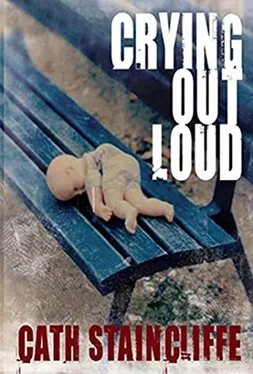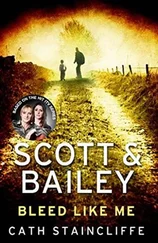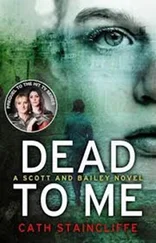I’d seen some childcare guru on the telly who advocated keeping handling to a minimum, leaving babies alone apart from set feeding times, letting them cry if need be, in order to establish a fixed routine. She told stories of infants who slept for a straight ten hours at night, who never fussed or fretted. But that type of regime wasn’t my style. It seemed cold and inflexible. And I’d be incapable of ignoring a crying child.
Was I too involved? Would I miss Jamie when she went? I scooped a spoonful of miso paste, made from fermented soya beans, mashed it with a little water and added it to my soup, sprinkling chilli flakes on top. Yes, I’d miss her a bit, but I had plenty of other stuff going on: I had a life, a job, a child, a lover, a business. I wasn’t praying that Jamie would stay. I’d like to catch up on my sleep for starters. Realistically, even if her mother never returned, I wouldn’t be able to keep her indefinitely. At some point I would have to inform social services.
I ate my broth with the last crust of home-made bread. When food prices had gone up we’d invested in a bread-making machine and never looked back. But the extra time the baby demanded had disrupted some of our everyday chores, like baking bread. I cleared my plates and got out the flour and yeast and seeds. I finally admitted to myself that my overreaction to Diane was because she’d put her finger on something I’d been trying to ignore. And rather than ’fess up and admit that the little girl had won me over and it would be a wrench when she went, I’d scrabbled to deny any such bond.
I took the baby round to the office with me, intent on working through my interview with Damien Beswick and making recommendations for Libby. It was chilly in the cellar room and I turned up the heating and switched on the table lamp. Before I started, I called Diane.
‘Hey,’ I said, ‘sorry if I was a bit prickly back then. Felt like you and Ray were ganging up on me.’
‘I don’t want to see you get hurt,’ she said.
‘I won’t. I can handle it. She’s a nice baby, but that’s all. Honestly. And I forgot the drawing.’
‘I’ll hang on to it for you.’
We said our goodbyes and I concentrated on the case. There were a number of items in Damien’s account that interested me or raised questions – though I couldn’t tell yet whether they had any bearing on establishing his guilt or innocence.
First, why had Charlie been in the cottage with the lights off but the door unlocked? If he’d gone for a sleep, surely he’d have locked up. If someone had been there before Damien (as he wanted me to believe) had that person switched off the lights when they were leaving? Why? A primal need to obscure what they’d done – in the same way that Damien had instinctively shut the door to hide the horror? After all, anyone coming to the cottage in the dark, like Libby, would be surprised to find the place in darkness. Leaving the lights on would actually make the place appear more normal, so attract less attention. As I mulled this over, I scribbled the gist of my ideas down in my notepad.
Damien had been uncomfortable when I asked him if he’d touched the body. What I’d been trying to find out was whether Charlie’s skin was cool to the touch – or warm. It would be in the police case notes; the pathologist called to the scene would have taken the temperature of the victim and estimated time of death. Maybe Geoff Sinclair would be able to remember? I made a note to phone him. Charlie couldn’t have been there for very long; he’d not left home till four.
The second thing that puzzled me was Damien’s description of Charlie’s car: how it had been ticking as the metal contracted, how the bonnet felt warm. Cars cool down pretty quickly anyway and it was November time so the temperatures would be lower; that suggested that Charlie had used it very shortly before his death, before Damien arrived.
Third was Damien’s ‘walker’. The passer-by with the rucksack. The only living soul that Damien admitted seeing from getting off the bus to climbing on board again later. Sinclair said the police had no knowledge of this character. But in the days after the murder, they would have crawled all over the village, interviewing anyone home or in the area that day and cross-referencing everybody’s accounts. Appeals had been made for witnesses: ‘ Anyone who saw anything, no matter how small, no matter how insignificant or irrelevant it may seem, please let us know. ’ And at that stage it would be another two weeks until Damien Beswick was apprehended.
So imagining this man existed, if he was an innocent bystander, he walked past the cottage on the very day that a brutal murder was carried out. He went home after his walk or whatever, had a shower, made his tea. The next day on the telly, or in the papers he read how close he was. Why not call it in? Maybe he didn’t notice Damien and so thought he had nothing to tell the enquiry. Maybe he got home that evening and changed for his holiday in New Zealand or wherever, and flew off and missed the brouhaha.
Or he kept quiet, lay low, because he wasn’t innocent, he hadn’t been up in the hills walking – he’d been killing Charlie. And he’d left the cottage moments before Damien arrived. Damien’s description was pretty vague but one detail that he had recalled without my prompting was that the man had been out of breath, panting, which would fit if you were hurrying away from a murder scene, though it would fit equally well if you were an energetic fell walker coming down the hills at the end of a hard day’s tramp. And he had been lugging a backpack with him.
If this was a suspect, what was his motive? Nothing was stolen apart from the wallet that Damien took. There weren’t any other suspects, unless… My mind darted back to the old business partner that Libby had mentioned: the alcoholic who bore a grudge even though he’d been the one dragging the firm to the edge of insolvency. I flicked through my notes: Nick Dryden. Had something happened that made him suddenly act many years after things had turned sour? Was there some personal crisis that had tipped him over the edge from angry drunk to homicidal maniac? How would he know where to find Charlie? Charlie wasn’t at home. Had Dryden been stalking him and followed him to the cottage? I shook my head at the image that conjured up: the little convoy setting out on a winter’s afternoon. Charlie in front heading for Thornsby and looking forward to seeing Libby; behind him Valerie driving Heather, the anxious wife looking for evidence to prove her suspicions, and after them Nick Dryden, out for blood.
I gave up on work. I would ring Sinclair the following day, see what he could tell me about the estimate for Charlie’s time of death, how warm the body was and if they had made any efforts to trace Nick Dryden and find out where he’d been the day Charlie was killed.
Maddie was in full strop from the moment she came out of school. It’s never a good time of day – I know she’s often tired and hungry and cranky so I made allowances when she slung her lunch box under Jamie’s buggy and it flew open, spilling wrappers and a squashed up drink carton. And when she refused to put her coat on and walked home shivering, going blue around the gills.
I made them some toast and hot chocolate and thought things would improve. They scoffed it at the kitchen table, where Jamie was sitting in her seat.
‘Jamie’s got her first tooth,’ I told them.
‘Let’s see.’ Tom stood up and craned his neck, as I gently pulled Jamie’s lower lip down. Maddie refused to be impressed. Maddie was jealous. The first flush of interest in the baby had given way to feeling usurped.
‘Feel it with your finger,’ I suggested. He did and Jamie clamped her mouth shut.
Читать дальше












